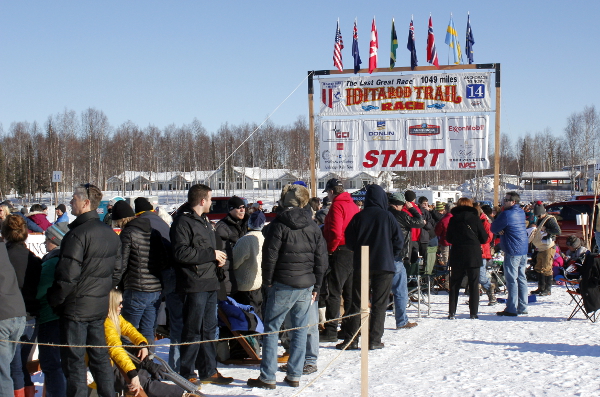
This year’s Iditarod restart will be in Fairbanks for only the second time in the race’s 43-year history. Poor trail conditions prompted the move, and many some mushers are happy with the change. For businesses in the Susitna Valley, however, there will be a significant economic impact.
The changing of the Iditarod restart location to Fairbanks has some mushers excited. Four-time race winner Jeff King told KUAC’s Emily Schwing that he’s looking forward to the new route.
“I’m personally thrilled. Not because of any other reason than I love a new trail, and I love going to new places, so I’m looking forward to some variation,” he said.
The decision to move the start of the race came after Iditarod Trail Committee board members observed very poor conditions on parts of the traditional trail. Talkeetna musher Jerry Sousa says that some sections, like the Dalzell Gorge, are rough even under favorable conditions.
“In a good year, the trail is bad,” Sousa said. “So, if they say it’s bad and snowmobiles can’t get through there, I certainly don’t want to risk my team mushing through a bad section of trail like that.”
While mushers have expressed approval of the change, it comes with an economic impact to many businesses. Paul Roderick is the owner of Talketna Air Taxi. He says he had more than 30 passengers booked for a flight to the Rainy Pass checkpoint, which are listed on the company’s website at $650 each. Normally, the Iditarod provides a monetary shot in the arm for businesses like his.
“It’s a pretty big hit, especially when you’ve got 30 or 40 people going somewhere,” Roderick said. “So, we’ve got to call them and re-work all the logistics–see what everybody wants to do.”
Paul Roderick says Talkeetna Air Taxi will likely still end up with business as a result of the 2015 Iditarod, and that businesses and villages are working quickly to reorganize logistics.
“They were getting phone calls at midnight last night looking for rooms and figuring out how they were going to switch everything, basically, from the Interior, like McGrath, to basing it solely out of the Yukon River,” he said.
Villages along the traditional Iditarod Trail will also miss out on the boost in visitors and money. Instead, that business will go to another set of villages further to the north. Iditarod CEO Stan Hooley says this year’s race will include checkpoints in Koyukuk and Huslia for the first time.
“Those are two communities with strong ties to the very start of mushing, so it will be exciting from that standpoint and meaningful in a lot of different ways,” Hooley said.
This winter is the second in a row with warmer temperatures and less snow than usual along the Iditarod Trail. Stan Hooley says this is not likely the end of the traditional trail, however.
“What it means for the future, we don’t know,” he said. “We certainly would prefer to travel the traditional Iditarod Trail, and we’ll do everything we can to do that in the future, but this year it’s just not in the cards.”
After the ceremonial start on March 7 in Anchorage, the 2015 Iditarod will begin in earnest in Fairbanks on Monday, March 9.




